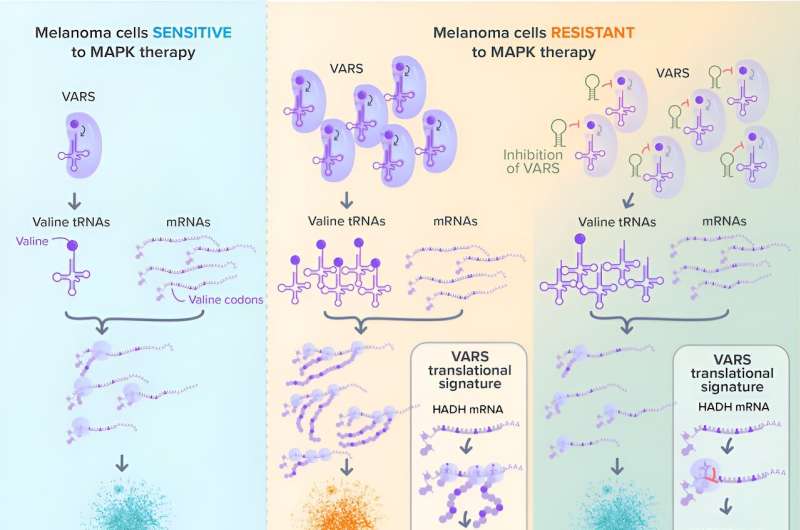This article has been reviewed according to Science X's editorial process and policies. Editors have highlighted the following attributes while ensuring the content's credibility:
fact-checked
peer-reviewed publication
trusted source
proofread
Researchers discover new therapeutic target for the treatment of melanoma resistant to targeted therapies

An international research team led by scientists from the University of Liège has discovered an interesting new therapeutic target for the treatment of melanoma resistant to targeted therapies. Inhibition of the VARS enzyme could prevent this therapeutic resistance by resensitizing tumors resistant to these targeted therapies. The work has been published in Nature Cell Biology.
Melanoma is one of the most serious and aggressive forms of skin cancer. When diagnosed early, melanoma is surgically removed. However, once metastases (i.e. secondary distant tumors) have developed, melanoma becomes difficult to treat, limiting patients' chances of recovery.
Every year in Belgium, around 3,000 people are diagnosed with melanoma. Doctors use targeted therapies to treat skin melanoma patients with a mutation in the BRAF gene—the gene responsible for producing B-Raf, the protein that promotes the development of cancer.
"This mutation is found in over 50% of patients," explains Pierre Close, researcher at the University of Liège. "While targeted therapies are highly effective in shrinking tumors, almost all patients who use them will develop acquired or secondary resistance to these therapies, which limits the long-term therapeutic response." It is therefore crucial to understand the mechanisms involved in resistance to targeted therapies in order to develop new therapeutic strategies for melanoma patients.
ARNt and VARS
The team from the Cancer Signaling Laboratory (ULiège) has just made a very interesting discovery in this field. "Thanks to the analysis of the data collected, we were able to observe that the adaptation of melanoma cells to targeted therapy was associated with a reprogramming of protein synthesis," explains Najla El Hachem, a researcher from the Belgian Foundation against Cancer.
"We combined a number of protein and RNA sequencing approaches and discovered that therapy-resistant cells developed a dependence on certain essential players in protein synthesis, regulating transfer RNAs (tRNAs)."
These players include the enzyme VARS (Valyl tRNA synthetase), which regulates aminoacylation—the process by which an amino acid attaches to tRNA—of transfer RNAs and promotes resistance in melanoma cells. Genetic inhibition of VARS therefore prevents therapeutic resistance and resensitizes tumors resistant to targeted therapies.
New hope for patients
"The promising results of this research pave the way for new treatment combinations for malignant melanoma. This discovery shows that the regulation of transfer RNAs plays an important role in therapeutic resistance," said Pierre Close.
In addition, inhibition of VARS could enhance the efficacy of targeted therapies and limit the development of resistance to treatment. These results could lead to the development of new therapeutic strategies and offer a new ray of hope for patients suffering from resistant melanoma.
The researchers will be continuing their work to transform this discovery into a concrete and effective therapeutic option.
More information: Valine aminoacyl-tRNA synthetase promotes therapy resistance in melanoma, Nature Cell Biology (2024). DOI: 10.1038/s41556-024-01439-2


















